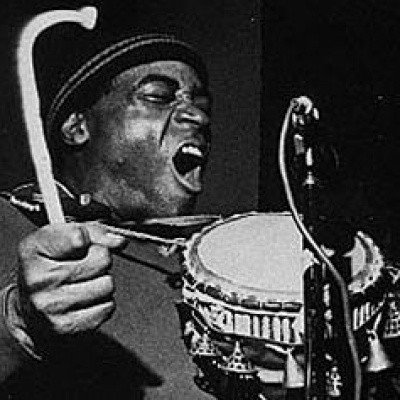
Rashied Ali
by Chris Kelsey The task of following Elvin Jones as drummer with John Coltrane must have been one of the most daunting situations ever entered into by a jazz musician. In the mid-60s, most jazz listeners would have assumed that Jones was the only drummer alive who possessed the requisite imagination, intensity, and powerful sense of swing necessary to drive Coltranes passions. As it turned out, even Elvin had limitations, and since Coltrane was all about transcending limitations, it seems proper that he would complement Jones polymetric intractability with the addition of Rashied Alis skittish, asymmetrical flexibility. The two drummers shared the bandstand briefly, before Jones, reportedly disgusted, left the band. Its not difficult to understand why the pairing proved ill-fated. Jones was an innovator, but he was bound to tradition — specifically, the tradition of ground-beat swing. He was the last stage in the evolution of the drummer-as-timekeeper; he reiterated swings primal importance, even as he extended the drummers role in terms of interaction with the ensemble. For his part, Ali almost completely abandoned a steady pulse, adopting instead a rhythmically irregular, textural, hyperactive approach that propelled the music in a manner at odds with Jones more literal style. The addition of Ali and the departure of Jones marked Coltranes last and most extreme step away from the jazz tradition. The removal of a steady beat, and the multitude of implied meters set by Ali and bassist Jimmy Garrison freed Coltrane to an unprecedented extent. Indeed, it was with the addition of Ali to his group that Coltranes free jazz period truly began. Ali studied at Philadelphias Granoff School of Music. He gained early experience with local jazz and R&B bands around Philadelphia. In 1963, he toured Japan with Sonny Rollins, before moving to New York, where he became involved in the free jazz scene there. Associations with Pharoah Sanders, Albert Ayler, Bill Dixon, and Sunny Murray preceded his tenure with Coltrane, which began in 1965 and lasted until the latters death in 1967. For a time, Ali continued playing with pianist Alice Coltrane, before going off on his own as a bandleader and musical organizer. In 1972, he helped coordinate the New York Musicians Festival. The next year, he formed his own record label, Survival, and opened his own performance venue, Alis Alley, a New York City loft space that presented free jazz performances until the summer of 1979. In the 80s and 90s, his presence on the scene was sporadic; he performed on occasion with saxophonist Makanda Ken McIntyre, and recorded with multi-instrumentalist Zusaan Kali Fasteau and tenor saxophonist David Murray. In 1987 he recorded as a member of the group Phalanx, with guitarist James Blood Ulmer, tenor saxophonist George Adams, and bassist Sirone. In 1991, he made the critically acclaimed album Touchin on Trane with bassist William Parker and tenor saxophonist Charles Gayle. The 90s found Ali at the helm of the band Prima Materia (initially co-led with Parker), an ensemble dedicated to interpreting the late works of Coltrane and Albert Ayler.
